|
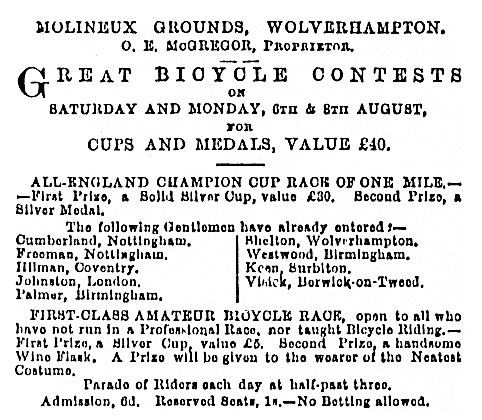
Wolverhampton Chronicle, 3rd
August, 1870. |
By the late 1860s a number of manufacturers in the
town were starting to produce ordinary, and later safety
cycles.
They were the first kind of mechanical personal
transport, which captured the public's imagination, and
became very desirable.
Oliver McGregor, being an astute businessman realised
the potential of organised cycle races in the grounds.
He built a cycle track and actively promoted race
meetings, which were a great success. |
| Many meetings were held, each with numerous races.
Most of the races were for high wheelers, which were the
fastest machines at the time, but tricycle races were
also held. Races took place weekly, and reports appeared
in the Wolverhampton Chronicle, which give a good idea
of what went on. In 1872 a meeting took place on the
20th and 21st of May, the highlight of the day being the
mile championship in which Wolverhampton rider Shelton
beat Surbiton's Jack Keen by ten yards, with a time of 3
minutes 13 seconds. In August Keen beat Shelton in a record time of 3 minutes 9.5 seconds.
By September he
had reduced his time to 3 minutes 6 seconds. |
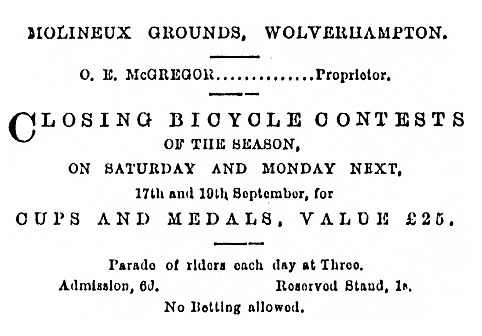
Wolverhampton Chronicle, 14th
September, 1870. |
| In August 1873 Shelton got his revenge when Keen
took a tumble and he had an easy win. On the same day he
also won the four mile race in a time of 13 minutes
34.75 seconds. Valuable prizes were offered to
successful competitors. In February 1874 F. Cooper beat
James Moore by two yards in the one mile race and won
£100, a large sum of money at the time. His time was 3
minutes 9 seconds. During the winter of 1874 a 50 mile
race was arranged between Jack Keen and David Stanton
who was considered to be the greatest cyclist in the
world. Unfortunately Stanton took a tumble after 31
miles, leaving Keen to win in a record time of 3 hours 9
minutes 19 seconds. |
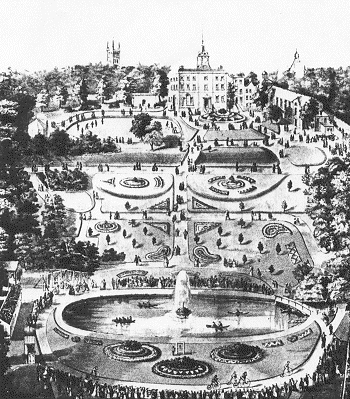
From a poster of around 1876. Courtesy of the late
Jim Boulton. |
The view opposite shows the skating rink on the
left, at the top of the garden, and the ornamental
boating lake, and fountain, surrounded by the cycle
track. |
|
In 1876 Oliver McGregor took on a
partner, Mr. Wiley, and opened a skating rink. The
grounds then became known as Molineux Pleasure Grounds.
Wolverhampton’s West Park opened in
the summer of 1881, and so in order to continue to
attract people to the Molineux grounds, McGregor decided
to concentrate on sporting events.
At the time, the rail network
covered much of the country, and enabled people to easily and quickly travel long distances in
a day. Thanks this new form of public transport, the
popular cycle races could easily attract many
thousands of spectators, which ensured the profitability of
the grounds.
During 1886 Oliver McGregor sold
the Hotel and grounds to Mr. Edwin Steer, the first of
many new owners. |
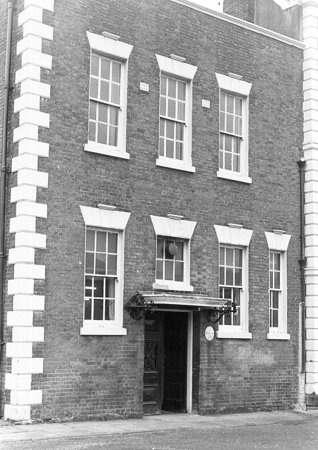
A view of the extension on the western side of the house. Courtesy of David Clare. |
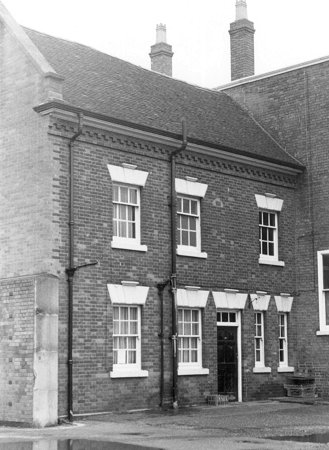
A view of the
far western extension. Courtesy of
David Clare. |
Also in 1886 Molineux became the venue for the
International Bicycle World Championships, such was its
stature. High wheelers eventually gave way to safety
bicycles. The popularity of the races greatly encouraged
some of the early manufacturers.
Many of the competitors opened their own workshops to
make bicycles. One of them, Daniel Rudge, an excellent
mechanic, made many improvements to his cycles and
produced the best racing machines of the day. He won the
first race that was held at Molineux and later received
the gold medal at the Stanley Cycle Club's first
exhibition in London.
Another local rider, Alfred Forder, began to produce
machines on a large scale and Edward Lisle founded the
Star Cycle Company. Within a short time, local cycle
enthusiast, John Marston was producing Sunbeam cycles. |
| The following is an account of one of the very early
Wolverhampton race meetings which comes from the
collection of the late Jim Boulton. Unfortunately the
date and the newspaper are unknown. |
|
Molineux Grounds, Wolverhampton - Champion
Bicycle Contests
The closing bicycle
contest for the present season, in
connection with the above delightfully
situated grounds took place there on
Saturday and Monday last. Three special
prizes were offered. The first prize being a
handsome silver cup of the value of £15, and
second and third prizes of £5 and £3; in
addition to which there were also money
prizes of £1 and 10shillings for the neatest
costumes.
The entries included
some of the most noted bicycle champions in
the kingdom – Turner of Paris and Johnson of
London, with several local celebrities of
the town and district; consequently the
events drew together each day a numerous
attendance of patrons and others interested
in the sports.
The only event on the
card was an ‘All Comers’ Mile Race’, for
which there were ten entries, but one
competitor – Cumberland of Nottingham did
not put in an appearance, and it was
therefore decided on Saturday, in order to
ensure a field of runners for the second
day, that the losers in the opening heats
doing the best time should be allowed the
privilege of again contending. On Saturday
the first prize of £1 for the best costume
was awarded to E. Shelton of Wolverhampton
who was attired in a rich mazarine blue
jacket, with white sash; whilst the second
prize of 10 shillings was awarded to Turner
of Paris, his costume being an emerald green
jacket and white breeches. The competitors
were paired in five heats, and one, Rogers,
walked over, the distance being nine times
round the circle and thirty yards. Some
excellent running took place and the five
heats were won by Forder, Johnson, Keen,
Turner and Shelton.
On Monday the winners
of the heats from the previous Saturday
again assembled to run off the concluding
heats for the prizes, and all the men being
first class, some excellent sport was shown.
Heat 1: Forder first, Rogers second. At the
first start Rogers took the lead, and soon
increased the distance to ten yards. On
going round for the fifth time however,
Forder quickly went to the front and after a
gallant struggle, during which they passed
and re-passed each other twice, Forder ran
in an easy winner by 15 yards in 4 minutes
32 seconds.
Heat 3: Turner 1st;
Shelton 2nd. In this heat Turner took the
lead from the beginning and kept it,
gradually increasing the distance each
round, until his opponent had no chance, and
the clever little Frenchman won the race by
nearly thirty yards. This was one of the
quickest races that has been run in this
Midland district, the winner’s time being
only 4 minutes 5 seconds, and Shelton being
only 5 seconds later.
The three winners then
drew lots for the final heats, and the
result was as follows: Heat 1: J.T. Johnson,
London 1st, A. Forder, Wolverhampton 2nd.
Forder winning the toss took the inside, and
started off at a terrific pace, Johnson
three yards behind. The pace increased up to
the third lap, when Forder missed his
treadle, and soon after that Johnson passed
him, and kept the lead, winning by about
twenty yards. Time 4 minutes 2 seconds.
Heat 2: Turner walked
over. The final heat was between Turner and
Johnson. A good start was affected, Johnson
being on the inside and leading by four
yards until the end of the second lap, when
Turner made a spurt and contested from the
inside, but Johnson still held it, and then
began the finest race that has been seen in
Wolverhampton. Neck and neck they went on at
a killing pace till the end of the 7th lap
when Turner managed to get the inside, and
after a spirited finish won by about a yard.
Johnson, considering the severe struggle
before with Forder, ran his machine
splendidly. Time 4 minutes. There was an
immense amount of excitement, and each man
was loudly cheered, this being the fastest
race ever run in Wolverhampton. We
understand that the shortest time in which a
mile has been run by the bicycle is 3
minutes 30 seconds. The prizes were then
awarded as follows: Turner 1st, the cup
prize; Johnson 2nd; Forder 3rd. Subsequently
a mile race has been run without using
bicycle handles, for a silver medal, which
was won by Shelton of Wolverhampton,
defeating Turner and Johnson. As we have
above stated there was a numerous attendance
each day; Mr. Trotman ably officiated as
clerk of the course and starter, and the
most commendable good order was kept
throughout each day’s proceedings. |
|
|
The cycle track was one of the best in the country,
and became the venue for many international races.
|
| Mr. McGregor continued to be as
inventive as ever, offering a wide range of attractions,
as can be seen from this advert.
Wolverhampton Chronicle, 28th July, 1875. |
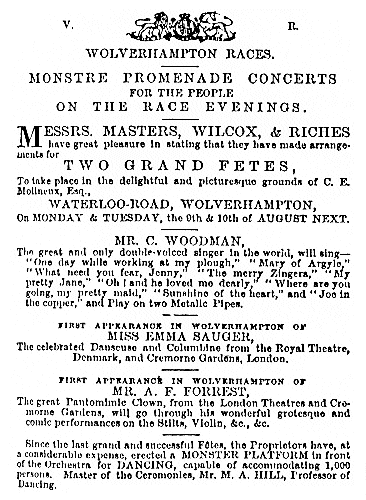 |
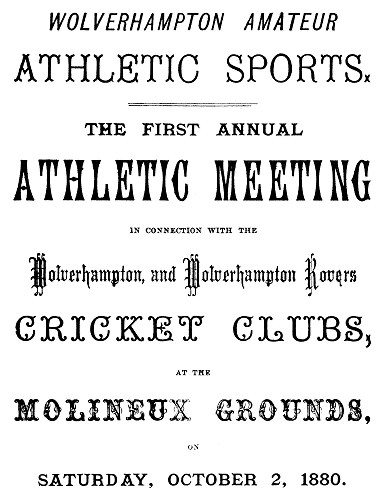 |
Many different types of
sporting events were catered for, including athletics,
and cricket. |
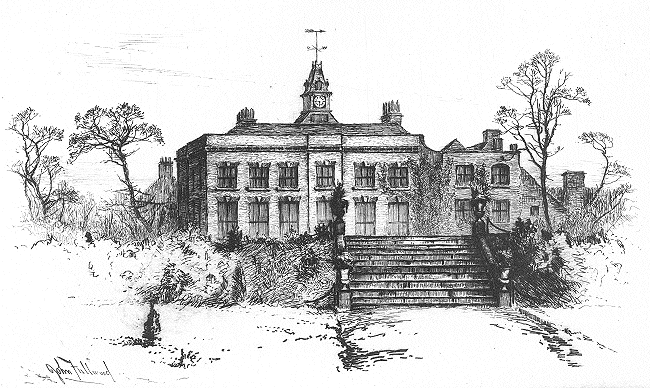
John Fullwood's drawing of the rear of the
house from the top of the garden.
 |
|
 |
|
 |
Return to
part 3 |
|
Return to
the
beginning |
|
Proceed to
part 5 |
|